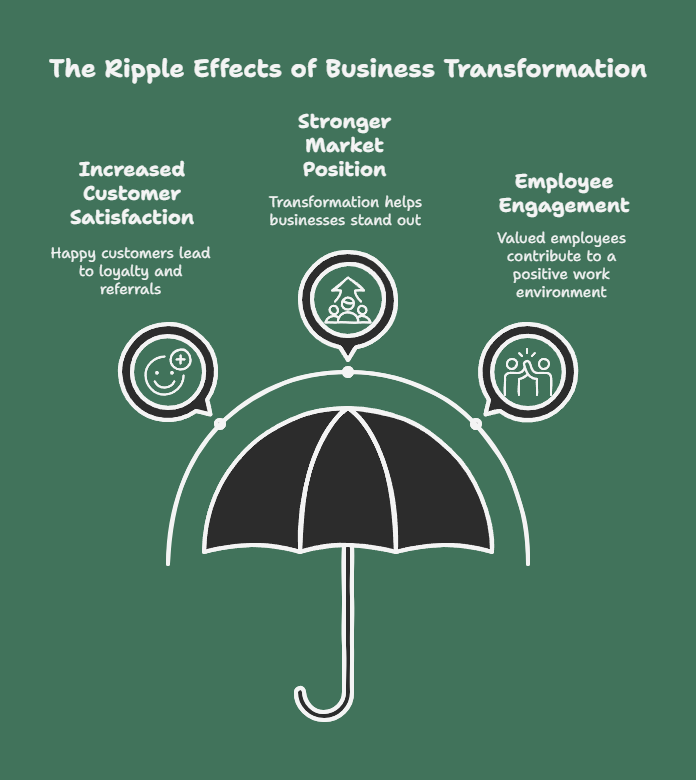Business transformation is about making changes that move your company toward growth and relevance. It’s not only a trend. It’s a well planned method for reshaping how your business operates.
This is supposed to deliver value and compete in the market. When you ask, What is business transformation?, you’re looking at a process that will reframe your company’s future.
Business transformation takes many forms. It starts from revamping operations. Adopting new technologies being one major form. Regardless of how you approach it, the goal remains the same – to keep your business competitive.
These are the points we discuss in our article.
- what is business transformation
- All its different types
- Perks of a well executed business transformation
Why Business Transformation Matters for Companies
Companies need to adapt constantly. Business transformation makes sure your company is able to meet changing demands. It’s about positioning your business to:
- serve customers better
- respond to market trends
- improve operational capabilities
For a company to stay relevant, especially in digital spaces, transformation is a necessity. Through transformation, your business can reduce costs and enhance your customer’s experience. When you fully understand what is business transformation, you will give your company the tools it needs to succeed now and in the future.
Types of Business Transformation
Not all transformations are the same. With your goals, you might focus on one type. Or might want to blend different approaches. These are the main types.
Digital Transformation
Digital transformation focuses on using technology to reshape all of these.
- business processes
- customer interactions
- services
It includes implementing these tools.
- cloud solutions
- AI
- automation
With digital transformation, your business will reach more customers. It will be empowered to make faster decisions.
Major benefits of digital transformation include the following.
- Enhanced Customer Experience
Digital solutions allow for quicker and more personalized customer interactions.
- Improved Decision Making
Having access to data enables more informed choices.
- Cost Savings
Automating repetitive tasks will save you time and reduce your business expenses.
Integrating a business digital transformation will bring immediate improvements. It will set your company up for continued growth.
Operational Transformation
This type of transformation focuses on improving internal processes. Operational transformation is about rethinking workflows and using resources better. This leads to increased productivity. It reduces costs. Many companies choose operational transformation as a starting point. That’s because it addresses everyday functions. This keeps operations running smoothly.
To carry out operational transformation:
- assess current processes to identify inefficiencies
- invest in employee training to align teams with new procedures
- implement tools that support process automation and data sharing
Operational transformation is about building a foundation for productivity. It supports every other aspect of your business.
Cultural Transformation
Culture is at the heart of every business. Sometimes transforming that culture is necessary to drive growth. Cultural transformation means creating an environment that embraces change.
One that values innovation. The one where collaboration is encouraged. When teams are aligned with your vision, they’re more likely to contribute better.
Consider these steps to promote cultural transformation.
- Encourage Open Communication
Create an atmosphere where feedback is valued.
- Empower Leadership
Strong leaders inspire teams to adapt to new values.
- Reward Innovation
Recognize efforts that contribute to your company’s progress.
Cultural transformation builds a positive work environment where your broader business goals are supported.
Business Transformation Consulting — Getting Expert Guidance
For companies unfamiliar with transformation processes, business transformation consulting provides the necessary support. Consultants bring their experience, tools and insights to help businesses shape their transformation. Be it planning or implementation, a consultant is a perfect guide.
Hiring a consulting firm benefits businesses of all sizes. That’s true especially when they want to:
- Gain Industry Specific Insights
Consultants bring experience with similar companies and markets.
- Speed Up Transformation
Expert guidance helps you achieve results faster.
- Avoid Common Pitfalls
Consultants identify and sidestep potential challenges.
Involving experts means you give your business a head start in the transformation process.
Benefits of a Well Executed Business Transformation
Business transformation offers benefits that extend beyond immediate results. Invest in long term growth strategies. So your business can enjoy improved adaptability, stronger client relationships and sustainable success.

The benefits of transformation encompass these.
- Increased Customer Satisfaction
Happy customers are more likely to return and refer your business to others.
- Stronger Market Position
A transformed business can stand out in competitive industries.
- Employee Engagement
Transformation gives way to an environment where employees feel valued.
How to Begin Your Business Transformation
Starting a business transformation might seem challenging at first. But breaking it into manageable portions makes it achievable. This is how you can kick start it all.
Define Clear Goals
Before any changes, outline your objectives. Ask yourself what you want to achieve. Whether it’s enhancing customer satisfaction or boosting productivity, clear goals guide your transformation.
Consider these questions.
- What are the company’s biggest challenges?
- Where do you see opportunities for improvement?
- Which areas of the business need the most attention?
Identify Areas for Change
After you’ve set your goals, focus on areas where transformation is most needed. This could include customer service, product development or internal processes.
Steps to identify change areas.
- Analyze customer feedback to understand pain points
- Evaluate internal processes for inefficiencies
- Research competitors to see how they address similar issues
Pinpointing specific areas allows for a focused, impactful transformation.
Build a Team for Transformation
A successful transformation relies on teamwork. Gather a group of motivated individuals from various departments who can contribute their skills and insights. Your transformation team will bring a fresh perspective. It will help build momentum across the company.
Responsibilities of a transformation team include the following.
- Setting benchmarks to track progress
- Gathering feedback from other employees
- Implementing strategies that align with company goals
Building a team dedicated to transformation ensures everyone is working toward a shared vision.
Embracing Business Transformation for a Brighter Future
Understanding what is business transformation leads you to new possibilities for your company. Whether you focus on digital, operational and cultural changes, each approach brings unique benefits. A well planned transformation positions your business for growth. It improves customer satisfaction. This helps you stay competitive.
Contact us for our services.




